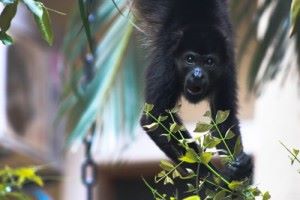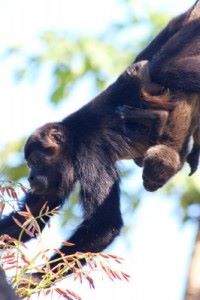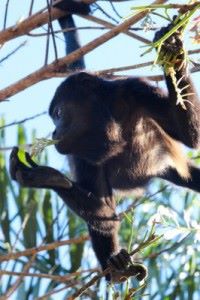By: Genna Marie
Howler monkeys are super common in the Tamarindo area. Here are Blue Water’s favorite tips to pretty much guarantee finding them.
1) Choose a Destination and Stick With It
Don’t try to squeeze in all of Costa Rica’s hotspots into a single week-long vacation. I know it’s tempting to cram Arenal, Monteverde, Tamarindo, Manuel Antonio and the Caribbean into 7-day period; but trust me – you’ll regret it. Sure, the country looks small on a map. But it can take a long time to get from one place to another. Squeezing in too many places will mean more time traveling in your car and less time trekking in the jungle looking for monkeys.
2) Use Your Ears
Now that you’ve chosen to stick around Tamarindo (or any other beach known for its monkeys), use your ears. You’ll likely be woken up by howler monkeys roaring just before sunrise. Follow the sounds until you find them. If not, listen for them at night. You’ll know them when you hear them, but if not click here to see what they sound like.
3) Ask the Locals
If you’ve been here a day or two and have not heard any monkeys, ask around. Costa Ricans are super friendly, and almost anyone will likely take a few minutes out of their day to talk to you about where they’ve recently seen primates. Good starting places in the Tamarindo area are along the beach paths to the Tamarindo Estuary (near Pangas Restaurant) and at “The Point” in Langosta, near Cala Luna. Go at sunset.
4) Go Hiking
Spend a day or two hiking, and you’re more likely than not to spot monkeys randomly. They’re everywhere. If you’re really ambitious, hire a local guide to up your chances to spot them. Watch the trees carefully. Which brings us to tip #5…
5) Look For Movement in the Trees
Howler monkeys are most active around sunrise and sunset, and for most of the rest of the day they are rather lazy and slow-moving. They could be right above you at this very moment and you wouldn’t even know it. Walking around town, look for slight movements in the trees or swaying leaves or black blobs on the branches (but don’t confuse monkeys with big brown termite nests!). If there’s a big, broad movement in a tree it’s likely either a big bird or a monkey.
6) Pay Attention
Once you’ve spotted some monkeys, pay attention to their patterns. Note the time of day, and pick some landmarks to help you remember exactly where you saw them. Monkeys tend to take the same daily routes for days at a time until they’ve exhausted all of the food on that route. They’ll likely be near the same spot within an hour or two of the same time tomorrow.
7) Take the Estuary Tour
If all else fails, taking the boat tour of the Tamarindo estuary is one of the most surefire ways to see monkeys.
Looking to nab some cool monkey photos? Check out these 9 tips for how to photograph monkeys in Costa Rica.
Photo Credits:
Photos by Genna Marie and Tamarindo Family Photos







